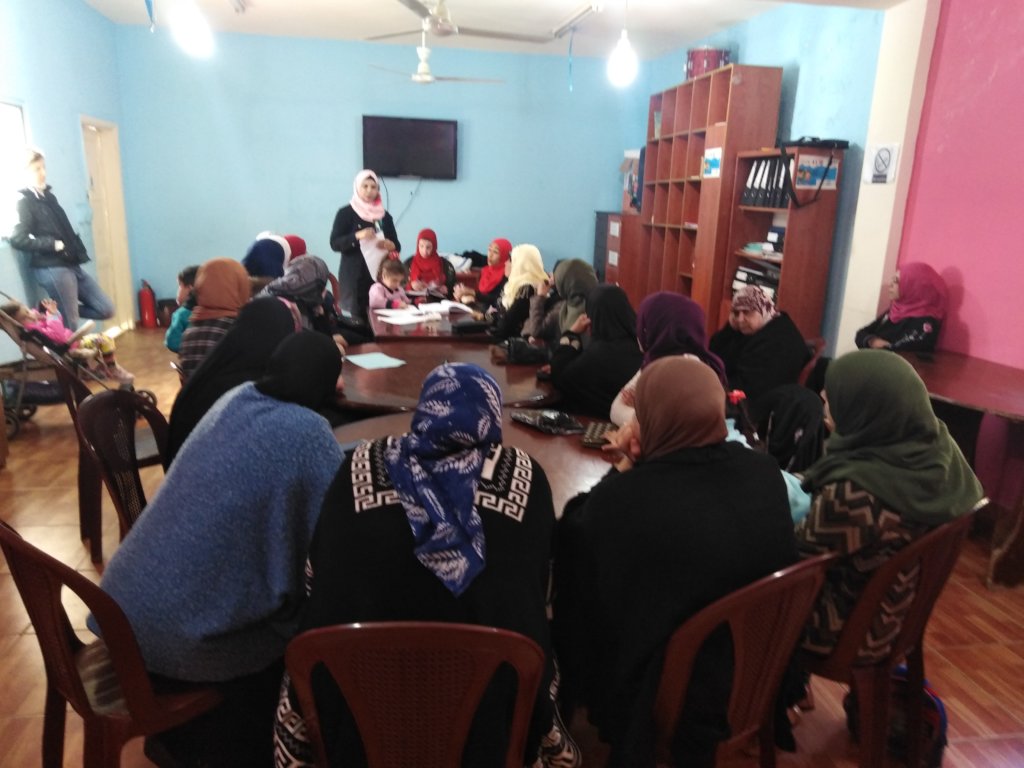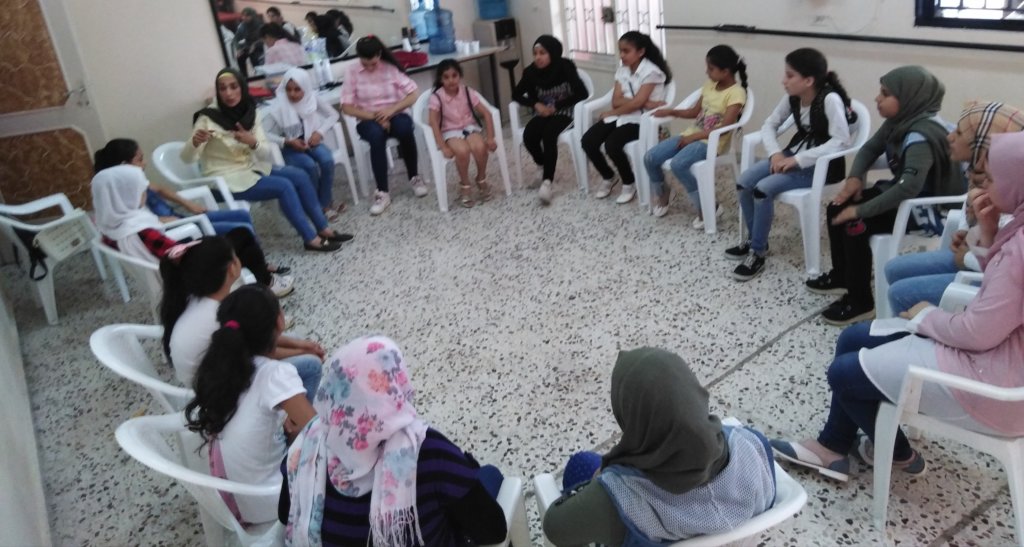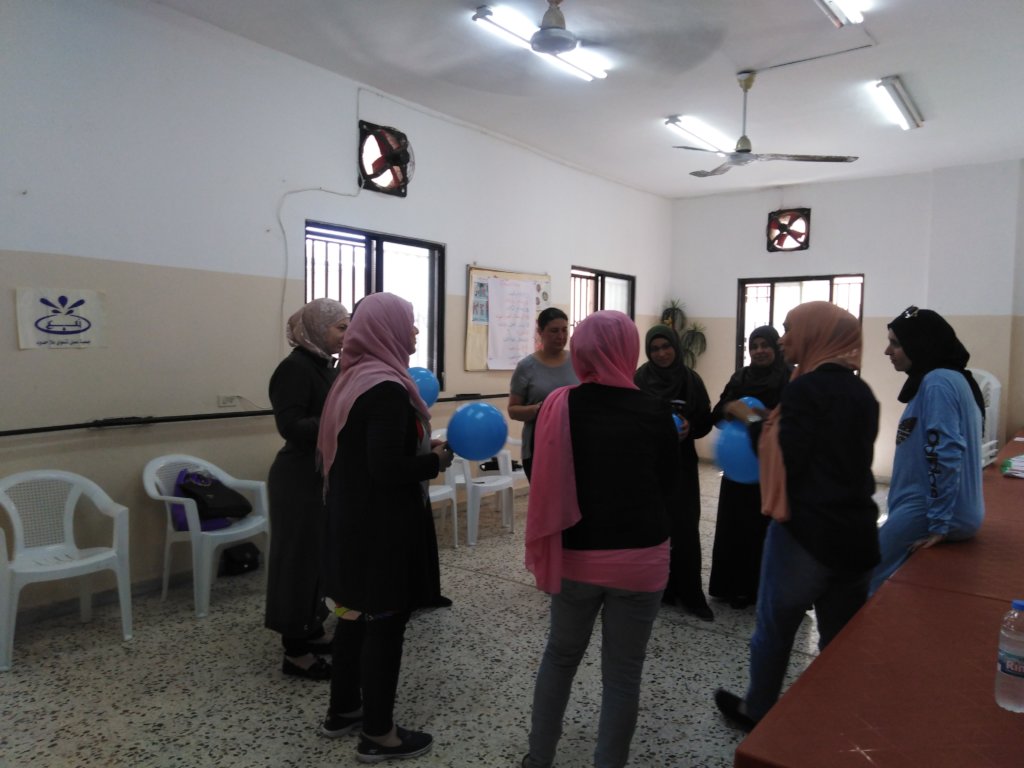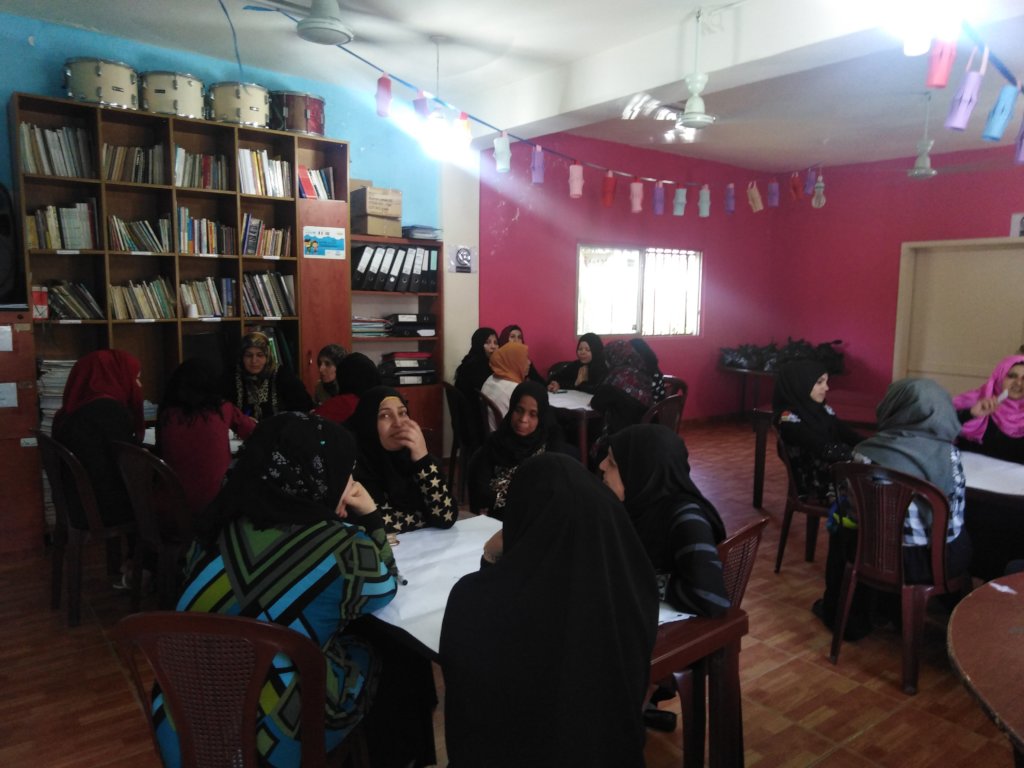By Hiba Hamzi | Program Coordinator
Background during and after the implementation of the project; Many refugees live in camps and un-official gatherings in southern and north Lebanon Palestinian refugee camps and un-official gatherings are one of Lebanon’s most crowded locations. We can’t find any place better than Syria. Syria is our country, our mother. Syria held us close. We lived in dignity.” Fatima has been living in Baraksat gathering a year and a half with her husband and five daughters. Through tears, she explains how they left Syria, everything is destroyed, her life is damaged, they are living in two rooms including the kitchen.
Conditions in the camps are extremely challenging, with no clean water and high rates of violence against women and children. Inhabitants of the camps are in constant danger from exposed live electrical wires, a daily threat as the government refuses to supply electricity to the camps. Many refugees cannot get jobs. Lebanese law does not extend citizenship rights to Palestinians or Syrians living in the country, limiting access to public healthcare and education in addition to jobs and increasing social harassment and stigma for refugees.
Yet, despite high levels of poverty, risk, trauma, and violence, which disproportionately fall on women, it is women who are at the forefront of long-term efforts to build community, create sustainable change, and protect and extend human rights.
Women in the refugee camps have a number of unique needs, and healthcare is foremost among them. Access to basic healthcare is an issue; for example, the Works Agency runs just one health center in the camp, and the generic hygiene kits that are distributed by relief agencies ignore women’s basic needs like sanitary napkins and other needs.
Finally, forced and child marriage is common in refugee camps. According to our grantee partners, some families see marrying off their young daughters as an opportunity to keep their daughters safe, to protect family honor, and to get out of poverty given their limited economic options. They do not see it as a form of violence.
Changing gender roles: Since being displaced and, as refugees in Lebanon, many women are having to take on different responsibilities to those they have had previously, including negotiating and arranging for housing for their families.
Lack of options for refugee women facing violence: In situations of gender-based violence, such as violence in the home, women often do not have any option to leave their home as they usually remain dependent on their family for housing. Lack of rights to their home can also be a result of not being named on any lease agreement or not having any separate income or ability to pay rent.
The most highlighted Achievements during the last period;
- 260 adolescent and women participated in the following awareness sessions;
o Communication skills sessions:: during brain storming no one of them know what are the main positive ways and mechanisms of communication ,they used violence with their children and family ,ten of them mention that they didn’t know who to communicate in good way ,after brain storming all participants were informed about communication ,its kind ,impact of it on the family and children ,how to communicate with other .
o Stress management session : during brain storming 3 women mention that they had stress and didn’t know how to deal with it and cannot control their feelings, also 25 women mention that it is unacceptable to visit a psychologist because the community believes that the psychologist is only for the insane.so after brain storming they were informed about stress and its negative impact physically and psychologically ,also they have been taught techniques that help them deal with stress .after session participants were very interested and asked for more sessions
o Workshops on reproductive health:Three awareness sessions have been conducted under the title of vaginitis, personal hygiene and period.
Finally, It is worthy to note that, the next period will continue focusing on Self-Hygiene and dignity, where as through the implementation of the sessions, personal hygiene and dignity kits will be distributed for the participants.
CASE STUDY
Code: EH080 IB
Nationality: PRL
Age: 22 years old
Marital status: Divorced
Address: Ein El-Hilweh camp
Number of children: a girl (6 years of age)
A brief about the case:
The survivor is a 22 year old woman, where she has had many experiences in her life, as she married twice and did not succeed in her marriage. When she was 13 years old she married for the first time and lived with him for 7 years as well as gave birth to her daughter, but she is now deprived of her.
The survivor lived an unstable life as she moved from place to place due to her husband work in many areas which lead to have several problems. She said that her first husband / divorcee is a stingy man who was not paying for the house as he asked her to bring money no matter what. (He was working in the army, which lead his repetitive absence from the house). He used to tell her there was no objection if she brought money from men but she refused to do so and then she went to her parents' house and because of customs and traditions that reside on refusing to divorce a 17 year old girl, her parents were forcing her to stay as she could not reveal what he was doing with her and saying to her until he hits her violently in front of their little daughter. Until she has no patience anymore and she complained in the military court and was divorced from him as they agreed that the girl should stay with her under one condition that she does not get married otherwise the girl will return back to her father. The survivor lived a year with her parents and her child until she met a man who used to be beside her and felt her interest and love. She gets married to him but after spending 8 months she was divorced from him because he is addicted to alcohol and gambling. She could not accept that, especially after her first experience, as she refused to give any justification or any other chance. But after her marriage, her previous husband took her daughter from her and now the girl is living with her father and his wife and goes to her mother one day per week and sometimes he prevents her from meeting her child.
The survivor lives with her parents as she is very angry about life and society, and regarding her psychological state is stated as depressed. She refuses to talk about what stress she is suffering from and what she feels is the rejection of living life as it is, in addition to sadness and anxiety about her daughter.
Intervention method:
After conducting several visits to the survivor and individual sessions for listening and unloading, we have been able to reduce depression, transform negative emotions and refuse living the life to positive emotions in order to think positively to accept conditions and face difficulties. As well as, the survivor was transformed from the state of introversion to the state of integration into society through involving her in vocational training for girls and returns her back to study and to think positively as well as involving her in the targeted group and giving her awareness sessions about stress and how to deal with emotions - how to deal with risks - communication - stress management….
Collecting Information:
- The survivor, her mother and her father.
Recommendations:
- Follow-up the survivor through individual sessions for listening
- Follow up the survivor in the awareness sessions to acquire skills which enable her to cope with life.
- Follow-up the survivor in vocational training
- Trying to help her in getting a job which is convenient for her.
Links:
Project reports on GlobalGiving are posted directly to globalgiving.org by Project Leaders as they are completed, generally every 3-4 months. To protect the integrity of these documents, GlobalGiving does not alter them; therefore you may find some language or formatting issues.
If you donate to this project or have donated to this project, you can receive an email when this project posts a report. You can also subscribe for reports without donating.
Support this important cause by creating a personalized fundraising page.
Start a Fundraiser


